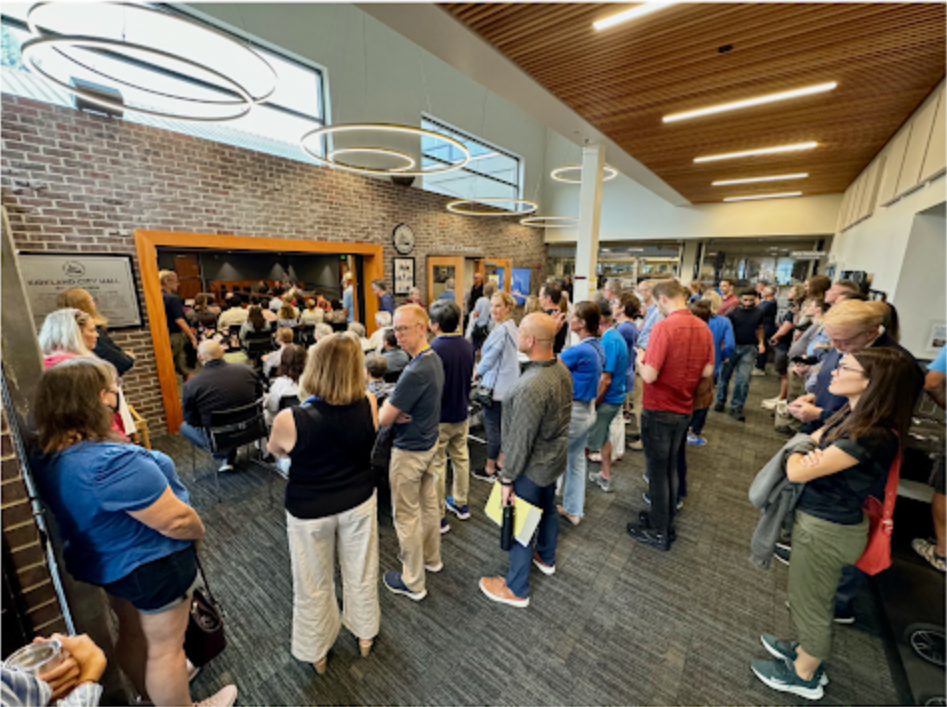
Housing & Zoning
Kirkland is the 3rd densest city in the state of Washington
There’s a lot of talk about increasing density here. Kirkland consistently ranks #3 in density (persons per square mile) per the Office of Financial Management - only behind Seattle and Mountlake Terrace. Lynnwood, Redmond and Bellevue — all now with light rail planned to Seattle — rank #6, #10 and #12, respectively.
We also hear a lot about state mandates. While Kirkland has already led the state in “middle housing'“ code, aka cottages, ADUs and DADUs, in 2023 the Washington State Legislature passed HB 1110. It requires cities like Kirkland to allow at least four dwelling units per lot in areas previously zoned for single-family housing. In certain areas—such as those within a quarter-mile of major transit stops or where at least two units are designated as affordable—up to six units per lot must be allowed. Additionally, cities must allow at least six of the nine designated middle housing types, such as duplexes, fourplexes, and townhomes.
However, Kirkland still retains discretion in how it implements these planning updates. This includes decisions about:
Infrastructure investments
Parking requirements
Setbacks and height standards
Design guidelines
Which housing types are there, and how are they distributed across the city
Kirkland’s 2044 Comprehensive Plan proposed significant changes beyond the state's requirements, such as eliminating residential zoning designations and reclassifying all residential areas as “Residential Mixed-Use.” While this might sound like a technical update, it could significantly change how neighborhoods evolve, inviting higher-density development without adequate neighborhood input or mitigation.
Why it matters:
That zoning change would have removed explicit protections for low- and medium-density neighborhoods
It would have reduced requirements for landscaped buffers and transitions between commercial and residential areas
Risked pushing out the types of housing that support larger families and long-term residents
Following significant public engagement, we successfully advocated for the City Council to reinstate Residential zoning designations in late 2024. This outcome proves that community voices still matter—and despite state mandates, cities always have choices.
Housing and Zoning discussions AND DECISIONS are ongoing.
On June 17th, the City Council voted 5–1 to approve a more aggressive version of the Middle Housing code for Kirkland—one that goes beyond what the state requires.
Here’s what it does:
Implements parking reductions early—
before neighborhood impacts have been studied and
prior to the timeline required by the state
Allows more dwelling units per lot than mandated under state law
Extends beyond the middle housing stipulations itself, layering new fees if building single-family homes above 2,000 sqft—on top of the rising property tax burdens created by tax exemptions granted to Multifamily developments (MFTEs).
While there is much yet to be decided about the new fee collection and distribution, the intention is to fund affordable housing development.
For families already struggling to live in Kirkland with the dream of home ownership, this will likely add significant cost - the objective is admittedly to discourage larger home redevelopment. The move prioritizes abstract ideology over local realities (and working families’ affordability).
But there was one important amendment worth noting. Councilmember John Tymczyszyn ultimately voted in favor of the overall package. Still, he successfully added a 12-month policy review—a critical checkpoint that allows future leaders to revisit this policy based on actual outcomes. An additional supporting amendment was also passed, allowing the 2026 Council to make modifications i.e. increasing the 2000 square feet threshold. Like neighboring towns, there is a concern that overall housing development could slow down.
Cherish Kirkland is hopeful that by the time the review arrives, more balanced and community-minded voices will be seated on the Council—leaders who are willing to listen, adapt, and work toward housing solutions that truly reflect the needs of our city.
The conscience of the council? The lone NO vote was delivered by Councilmember Jon Pascal with comments celebrated by our members for his “clear explanation,” “rational and broad thinking,” and “common sense and putting true community interests first!”
Read Council Member Pascal's comments in full.
View a recording of the June 17th City Council meeting with noteworthy timestamps at 1:57:30 (community members) and 3:42:50 (John Pascal).
Act Now on Housing & Zoning!
Ask for a Senior Solution
Help Kirkland Seniors with Affordable Housing
Write the City Council today and tell them think about solutions that help Seniors with more housing options to “stay in place” in their neighborhods - an idea backed by many Houghton residents and nextdoor school families (concerned about regular housing at this site adding commuter traffic).
Access suggested text and send a letter to the city council about these latest policy proposals.
Protect
Fire & Building Codes for Stacked Housing
Whatever it is, the way you tell your story online can make all the difference.
Click to access suggested text and send a 1-click letter to the State Building Code Council (SBCC) and urge them to reject Markus Johnson’s amendment, and support the use of the IBC for stacked flats.
(Or if your browser fails to open an email window, email sbcc@des.wa.gov directly!)
Show up!
@City Hall on every other Tuesday
Help us bring the blue to City Hall! So City Council knows Kirkland voters stand behind a non-partisan elected body that knows its job is to ensure infrastructure and services levels for existing residents and businesses through balanced growth and planning.
Kirkland City Hall - 123 5th Ave, Kirkland, WA 98033 (Directions)
Related issues:



